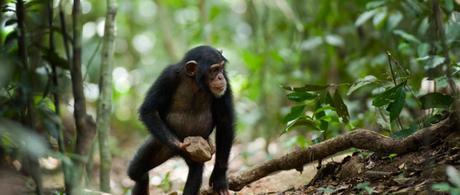
A new study on captive apes has revealed that chimps have morality. Or at least, one key component of it: the ability to recognise when social norms are being violated. However, whilst they seem capable of recognising these situations, they don't care; unless that violation is directly affecting their in-group.
The research consisted of showing captive chimps various videos of wild chimps doing stuff. Most of it was boring stuff, like cracking nuts open or hunting. However, one video consisted of a chimp murdering a chimp baby. A scarily prominent activity amongst wild populations. This video got the chimps attention and they focused on this the most. The researchers took this to mean that they were recognising something wrong was going on. However, they did not negatively react to this video. There were no screams of protest or really any other evidence of arousal. So apparently chimps have morality in the form of social norms - and the ability to spot when those norms were being violated. But if that violation occurs in a different group they don't care.
The presence of this ability in both chimps and humans indicates it may be an evolved trait we inherited from our common ancestor. Us and chimps were the same species 7 million years ago. Might that species have had social norms like chimps? Now, to be fair this isn't exactly the first time an "evolved" component of morality has been identified. Caring for family, reciprocity (you scratch my back, I'll scratch yours) and laziness have also been identified as evolved motivations that may result in 'moral' behaviours.
Nor is this the first time that it's been shown chimps have morality; with many of the aforementioned characteristics also seen in them. And there is some evidence of social norms in chimps as well, with chimp "policemen" intervening to maintain these norms.
So if we knew chimps have morality all along, what's the significance of this?
Well for starters we may well be able to add "social norms" onto the long list of behaviours with an evolved component. Secondly it provides further confirmation these social norms exist in chimps, which can improve our understanding of their behaviour. Existing evidence was a tad circumstantial (policemen chimps could simply be trying to maintain the status quo out of self interest, for example). That is, assuming this new research on captive chimps is reliable. And it might not be completely accurate, so take it with a grain of salt.
But perhaps the most interesting finding is that the ability to spot social norm violations and the ability to react to these is distinct. A similar phenomena is seen in humans. We have a distinct "in-group, out-group" mentality; treating those in the out-group differently.
Perhaps if we can figure out why they developed separately we can try and fix it. Encourage people to treat each other better, even if they aren't part of your in-group. It might be our only defence when the chimp rebellion inevitably happens.
Reference
von Rohr, C. R., van Schaik, C. P., Kissling, A., & Burkart, J. M. (2015). Chimpanzees' Bystander Reactions to Infanticide. Human Nature, 26(2), 143-160.

